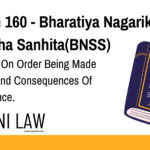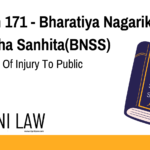Code:
(1) Whenever an Executive Magistrate is satisfied from a report of a police
officer or upon other information that a dispute likely to cause a breach of the peace exists
concerning any land or water or the boundaries thereof, within his local jurisdiction, he
shall make an order in writing, stating the grounds of his being so satisfied, and requiring
the parties concerned in such dispute to attend his Court in person or by an advocate on a specified date and time, and to put in written statements of their respective claims as
respects the fact of actual possession of the subject of dispute.
(2) For the purposes of this section, the expression “land or water” includes buildings,
markets, fisheries, crops or other produce of land, and the rents or profits of any such
property.
(3) A copy of the order shall be served in the manner provided by this Sanhita for the
service of summons upon such person or persons as the Magistrate may direct, and at least
one copy shall be published by being affixed to some conspicuous place at or near the
subject of dispute.
(4) The Magistrate shall, without reference to the merits or the claims of any of the
parties to a right to possess the subject of dispute, peruse the statements so put in, hear the
parties, receive all such evidence as may be produced by them, take such further evidence,
if any, as he thinks necessary, and, if possible, decide whether any and which of the parties
was, at the date of the order made by him under sub-section (1), in possession of the
subject of dispute:
Provided that if it appears to the Magistrate that any party has been forcibly and
wrongfully dispossessed within two months next before the date on which the report of a police officer or other information was received by the Magistrate, or after that date and
before the date of his order under sub-section (1), he may treat the party so dispossessed
as if that party had been in possession on the date of his order under sub-section (1).
(5) Nothing in this section shall preclude any party so required to attend, or any other
person interested, from showing that no such dispute as aforesaid exists or has existed; and
in such case the Magistrate shall cancel his said order, and all further proceedings thereon
shall be stayed, but, subject to such cancellation, the order of the Magistrate under
sub-section (1) shall be final.
(6) (a) If the Magistrate decides that one of the parties was, or should under the
proviso to sub-section (4) be treated as being, in such possession of the said subject of
dispute, he shall issue an order declaring such party to be entitled to possession thereof
until evicted therefrom in due course of law, and forbidding all disturbance of such possession
until such eviction; and when he proceeds under the proviso to sub-section (4), may
restore to possession the party forcibly and wrongfully dispossessed;
(b) the order made under this sub-section shall be served and published in the manner
laid down in sub-section (3).
(7) When any party to any such proceeding dies, the Magistrate may cause the legal
representative of the deceased party to be made a party to the proceeding and shall thereupon
continue the inquiry, and if any question arises as to who the legal representative of a
deceased party for the purposes of such proceeding is, all persons claiming to be
representatives of the deceased party shall be made parties thereto.
(8) If the Magistrate is of opinion that any crop or other produce of the property, the
subject of dispute in a proceeding under this section pending before him, is subject to
speedy and natural decay, he may make an order for the proper custody or sale of such
property, and, upon the completion of the inquiry, shall make such order for the disposal of
such property, or the sale-proceeds thereof, as he thinks fit.
(9) The Magistrate may, if he thinks fit, at any stage of the proceedings under this
section, on the application of either party, issue a summons to any witness directing him to
attend or to produce any document or thing.
(10) Nothing in this section shall be deemed to be in derogation of powers of the
Magistrate to proceed under section 126.
Explanation:
This section deals with the power of an Executive Magistrate to intervene in disputes regarding land, water, or their boundaries, which threaten to disrupt peace within their jurisdiction. Here is a review of Procedure Where Dispute Concerning Land Or Water Is Likely To Cause Breach Of Peace
Procedure:
- Initiation: The Magistrate initiates the proceedings based on a report from a police officer or other credible information indicating a potential breach of peace due to a land/water dispute.
- Order and Notice: The Magistrate issues a written order specifying the grounds for intervention and requires all parties involved to appear before the Court, present their claims in writing, and provide evidence.
- Inquiry: The Magistrate conducts an inquiry, focusing on determining possession of the disputed property as of the order date, without considering the merits of the ownership claims.
- Decision and Order: The Magistrate decides which party, if any, was in possession at the relevant time. They can also restore possession to a party who was wrongfully dispossessed within the preceding two months. The Magistrate issues an order declaring the entitled party’s possession until legally evicted, and forbids any disturbance of that possession.
Illustrations:
- Scenario: Two neighbors claim ownership of a piece of land.
- Magistrate’s Action: The Executive Magistrate issues an order for both parties to attend court, providing their statements and evidence of possession.
- Scenario: A farmer claims he was forcibly evicted from his land two weeks prior.
- Magistrate’s Action: The Magistrate, after receiving a police report, treats the farmer as being in possession at the time of his order, allowing him to stay until a lawful eviction occurs.
- Scenario: A party presents evidence that no dispute exists.
- Magistrate’s Action: The Magistrate cancels his initial order and halts further proceedings, determining there was never a dispute.
- Scenario: Crops on disputed land are at risk of decay.
- Magistrate’s Action: The Magistrate orders the crops to be sold to prevent loss and decides the disposal of proceeds after the inquiry.
Common Q & A:
- Q: What constitutes a breach of the peace?
- A: A breach of the peace refers to any act that may lead to public disorder, violence, or civil unrest, such as disputes over property boundaries.
- Q: Can a Magistrate issue an order without a police report?
- A: Yes, a Magistrate can act on any information received indicating a potential dispute, not solely based on police reports.
- Q: How is the order served to the parties involved?
- A: The order is served according to the procedures outlined in the Sanhita, which may include personal delivery and public posting in a conspicuous location.
- Q: What happens if one party does not attend the hearing?
- A: If a party fails to attend, the Magistrate may still proceed with the inquiry based on the available evidence and statements from the attending party.
- Q: Can the order of possession be contested?
- A: While the initial order of possession is final, it can be challenged in subsequent legal proceedings, but the order remains effective until overturned.
- Q: What if the crops are sold, and the inquiry determines the seller was not in possession?
- A: The proceeds from the sale will be managed according to the Magistrate’s final order post-inquiry, ensuring fairness based on the established facts.











